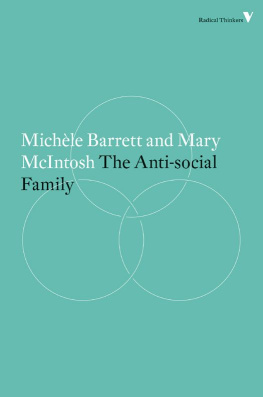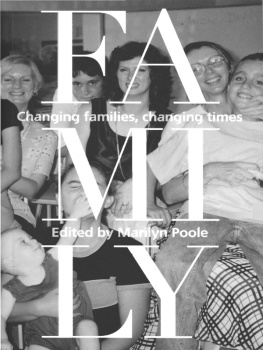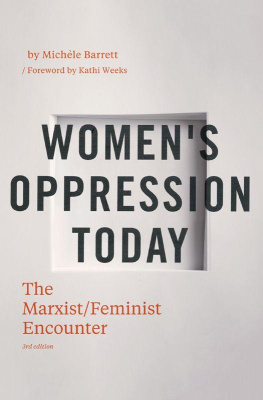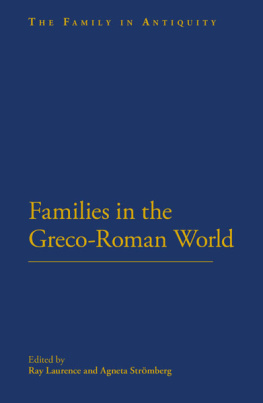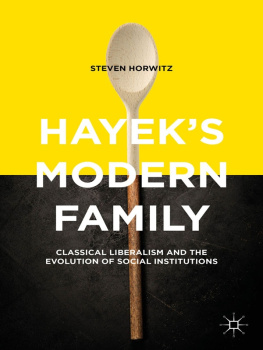This edition published by Verso 2015
First published by Verso 1982
Michle Barrett and Mary McIntosh 1982, 1984, 1985, 1987, 1990, 1991, 2015
All rights reserved
The moral rights of the authors have been asserted
Verso
UK: 6 Meard Street, London W1F 0EG
US: 20 Jay Street, Suite 1010, Brooklyn, NY 11201
www.versobooks.com
Verso is the imprint of New Left Books
ISBN-13: 978-1-78168-759-8
eISBN-13: 978-1-78168-760-4 (US)
eISBN-13: 978-1-78168-761-1 (UK)
British Library Cataloguing in Publication Data
A catalogue record for this book is available from the British Library
Library of Congress Cataloging-in-Publication Data
A catalog record for this book is available from the Library of Congress
v3.1
Contents
Preface and Acknowledgements
Marx and Engels may have called, in the polemical rhetoric of the Communist Manifesto, for the abolition of the family, but most socialists have long since regarded this as a flight of utopian fancy. An uneasy truce prevails over this most unpopular of orthodox socialist demands. From time to time, however, the calm is troubled, for the politics of the family simply will not lie down. The early years of womens liberation saw a damning indictment of family life; more recently the left has had to confront the equally militant pro-family stance of the new right. We believe that in the long term socialists and feminists must develop a political consensus on the family and that the precondition for this is more open debate on where we stand.
A major difficulty with this is the fact that the family is such a slippery phenomenon. The view we take in this book is that the family must be understood in two senses. It is, of course, a social and economic institution. In the present period it is an institution in which, by and large, households are assumed to be organized on the basis of close kinship relations. We could go further and say that in the present period it is an institution in which households are assumed to be organized, by and large, on the basis of a division of labour between a primary breadwinner (male) and a primary childrearer (female). Although these are assumptions, they are nonetheless part of the family, since they form a crucial element of the conditions on which women and men are employed, the level of their wages, and state taxes and benefits.
Many feminists have pointed out that as a social institution this form of family-household is markedly less prevalent than it is usually assumed to be. The stereotypical nuclear family accounts, roughly, for only a third of households in Britain today. Yet the media give the impression that the entire population is securely bound up in it. So a second dimension of what we refer to when we talk about the family must be the family as an ideology. In many ways the institution and the ideology are reciprocally related, enjoying mutual reinforcement. Yet the ideology of the family is perhaps much stronger, in its own right, than we often allow. The model of family life has pervaded our society in its public institutions to such an extent that, far from speaking of the decline of the family, we should be speaking of the familial character of society.
It is this twofold character of the family that makes it particularly difficult to analyse. Certainly it accounts for the strategy we have had to adopt in writing this book, where different chapters focus on what inevitably appear to be quite disparate topics and levels of analysis. The family can be addressed from the point of view of what needs it is thought to serve; how it is represented culturally; how one understands the acquisition of femininity and masculinity; what should be done about state policy and the law. Clearly some of the issues discussed can more readily be translated into strategies for change than others. Our final chapter sets out for discussion some possibilities of a practical kind. These are not necessarily the most important changes to fight for, and certainly not the only ones, but we regard them as possible concrete targets. More general changes, such as the total eradication of familial ideology from the media and all public discourse, can readily be inferred from the books general discussion.
Two notable absences from the book need some brief explanation. We do not make it clear whether the analysis we present applies across the several family forms of the different ethnic groups in Britain or is restricted to the dominant white family. The appeal of these different family forms, and their constraints and tensions, are undoubtedly distinct, the more so because they exist as forms of ethnic solidarity in a hostile environment. Nevertheless we believe that the same principles of critique would apply, though it is not for white feminists to work out the detailed form that these would take. Some of the strategies for change that we propose would open up new opportunities for everyone in the society, whatever their ethnic origin.
A second absence concerns the relation between the family and sexual preference. It would be ironic for us to be accused of reproducing the hegemonic heterosexism of our culture. Nevertheless we have to some extent inevitably done this, as we believe the present ideology of the family to be so steeped in heterosexism that any realistic engagement with familialism must locate the discussion within that framework.
We have found this a difficult book to write and for this reason are particularly grateful to those who have helped us. Francis Mulhern gave considerable advice and encouragement, and Catherine Hall commented on the entire draft for us. We also thank David Plotke for information about the American pro-family lobby, and Angela Weir for comments on . Obvious though it may be, we should point out that many of the ideas of the book are indebted to discussions and campaigns in the womens movement; in particular we have benefited greatly from the work of Rights of Women and of the Fifth Demand (legal and financial independence) group, especially in relation to policy recommendations.
It is not hard to identify the reason why the book has been difficult to write. The family is a contentious and emotive subject and we are painfully aware that many of our own family and friends will disagree with the arguments we make here. Although we have used a rather impersonal style, no author or reader can be completely detached from the personal implications of the arguments. But personal life is at one and the same time the story of our own lived experiences the context of our deepest motivations, rewards and frustrations and also the product of a particular moment in history and a particular structure of society. So we are often divided between subjective experience on the one hand and political analysis on the other. In recognizing the powerful appeal of the family, and acknowledging the real satisfactions that it can offer, we have drawn from our own experiences. We hope that the book contributes to the difficult project of reconciling private experience and social need, and of dealing with the ambivalence and contradiction that bedevil the political theorization of subjectivity.
I
A Question of Values
1. The Political Context
The family has long been a controversial subject but the present political conflict over it is one in which the stakes have been raised significantly. Indeed, a delegate to the Council of Europe in Strasbourg, speaking of the paganistic and atheistic practice of artificial insemination, fearlessly identified nothing less than a world campaign to undermine marriage and the family as the fundamental unit of society. If such an international conspiracy does exist, systematically struggling to erode the integrity of the family, it is certainly meeting a vigorous fightback.

